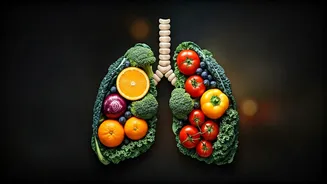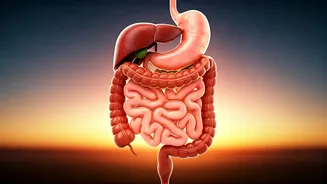Dairy's Breathing Impact
Dairy products, often staples in many diets, can cause inflammation and increase mucus production in the respiratory tract. Excessive mucus can make it
hard to breathe, particularly for those with asthma or allergies. The proteins found in milk and other dairy items can trigger inflammatory responses in some individuals. This may lead to congestion and worsened respiratory symptoms. For example, cheese, yogurt, and ice cream might exacerbate these effects. Reducing dairy intake could improve lung health and ease breathing difficulties. Individuals sensitive to dairy may find their symptoms diminish when they limit or avoid these foods. Alternatives like plant-based milks and yogurts can be used instead.
Processed Foods Beware
Processed foods are often high in sodium, trans fats, and added sugars, which can trigger inflammation throughout the body, including the lungs. The refined carbohydrates and unhealthy fats found in these foods can disrupt the balance of gut bacteria, influencing inflammation levels. Furthermore, the additives and preservatives present in processed foods can irritate the respiratory system, potentially leading to increased coughing and shortness of breath. Common culprits include packaged snacks, frozen meals, and fast food. Reducing consumption of processed items is critical to supporting lung health, as it limits exposure to harmful substances and helps to reduce overall inflammation. Opting for fresh, whole foods provides vital nutrients and minimizes the intake of damaging ingredients.
Salty Sensations' Effect
Excessive salt consumption can cause fluid retention, adding stress to the lungs. High sodium levels can increase blood pressure, which in turn strains the cardiovascular system and potentially impacts lung function. Eating too much salt can also worsen conditions like asthma, potentially leading to increased coughing and wheezing. Processed foods, fast foods, and salty snacks are significant sources of dietary sodium. Limiting added salt in cooking and being mindful of food labels can significantly reduce overall sodium intake. Choosing fresh, unprocessed foods is a key part of reducing salt in the diet, fostering better respiratory health, and promoting overall well-being. Proper hydration can also help balance sodium levels.
Sugary Sweet Risks
Consuming large amounts of added sugar can contribute to chronic inflammation, which is harmful to lung health. Sugar can also weaken the immune system, making individuals more susceptible to respiratory infections like the flu and pneumonia. Diets rich in sugar can lead to weight gain, and excess weight can put extra pressure on the lungs, making breathing more difficult. Sugary drinks, candies, and baked goods are common sources of added sugars. Reducing sugar intake through food choices can help reduce systemic inflammation. It may support the immune system and promote healthy lung function. Opting for whole fruits over processed sweets provides natural sugars and essential nutrients, offering a healthier approach to managing sugar intake.
Refined Grain's Downside
Refined grains, such as white bread and white rice, lack the fiber and nutrients found in whole grains, contributing to inflammation and increased mucus production. These foods are quickly digested, leading to blood sugar spikes and crashes, which can indirectly affect lung health. Increased mucus can obstruct airways, causing breathing difficulties and worsening respiratory symptoms, especially in individuals with asthma or COPD. Fiber-rich, whole-grain options help to regulate blood sugar levels. They can also support a healthy gut microbiome, which is essential for overall health and reducing inflammation. Substituting refined grains with whole grains such as brown rice, quinoa, and whole-wheat bread can enhance lung function.
Fried Food's Impact
Fried foods are often cooked in unhealthy oils, high in trans fats, and can trigger inflammation in the body. The high-fat content can hinder the proper functioning of the lungs and the entire respiratory system. The process of frying can also create harmful compounds, which can irritate the lungs when inhaled. Regular consumption of fried foods might worsen existing respiratory conditions. It is important to avoid foods that are fried. Eating baked, grilled, or steamed alternatives can help in better lung health, as they avoid the harmful effects of unhealthy oils and the formation of dangerous compounds. This approach enhances overall health and supports better respiratory function.
Alcohol and Lungs
Excessive alcohol consumption can have a negative impact on lung health. It can suppress the immune system, making individuals more vulnerable to respiratory infections. Alcohol can also irritate the airways and interfere with the lung's ability to clear mucus, which can lead to increased coughing and shortness of breath. Chronic alcohol use can potentially worsen conditions like asthma and COPD. Moderation in alcohol intake is vital for lung health. Individuals with respiratory conditions should consider limiting or avoiding alcohol to safeguard their respiratory health. Prioritizing a healthy lifestyle and dietary choices is crucial for maintaining optimal lung function.














